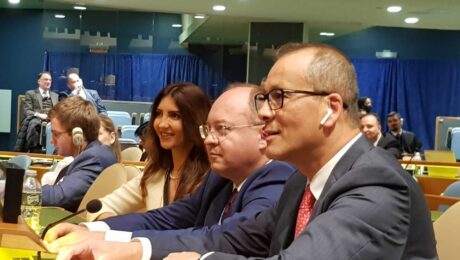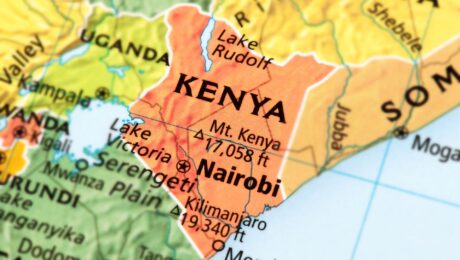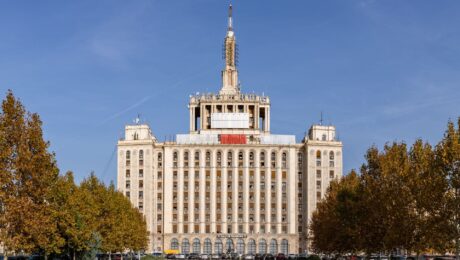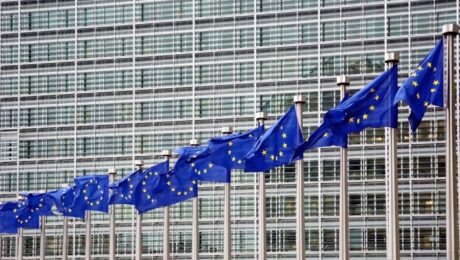Understanding the US BOI Report’s Impact
The US Beneficial Ownership Information (BOI) Report is a crucial development, particularly relevant for those in the Romanian business sector with connections to the United States. This report has become a focal point in corporate compliance and transparency, and this is something not only business owners but also lobbyists and advocates should be aware of.
From January 1st, 2024, it’s mandatory for US-based companies, under specified conditions, to submit the BOI Report. The purpose of this document is to transparently reveal the real owners and key decision-makers of these companies.
This report, officially known as the Beneficial Owner Information report, is a requisite filing for every US-based company with the Financial Crimes Enforcement Network (FinCEN), an agency under the U.S. Department of the Treasury. It aims to disclose the identities of beneficial owners – those who ultimately own or exert control over the company – along with company applicants and the individuals who first registered the entity in the US.
Filing a BOI report requires companies to detail information about their structure, their beneficial owners, those who ultimately hold ownership or exert control, the company applicants, and the individuals who established the company in the US.
Under this legislation, a ‘beneficial owner’ is defined as any individual who:
- Holds significant control over the company, or
- Possesses or controls a minimum of 25% ownership in the company.
Individuals capable of making pivotal decisions for the company are considered to hold significant control.
While there are certain exemptions, the introduction of this legislation marks a critical step by the US in its efforts to combat financial crimes like money laundering and tax evasion.
For those uncertain about the applicability of the BOI Report to their situation, consulting firms that specialize in the BOI Report process is highly recommended. They provide expert advice and insights into navigating this new regulatory landscape.
We recommend working with Corporate Mile, an American-based legal company which helps entrepreneurs clarify all aspects of their obligation to fill out a BOI Report or not if part of the exemptions to BOI filling. For all the questions regarding BOI and its impact on your business, if you have set up a company in the US, you can contact them directly or consult any other similar reliable company.
- Published in News
Romania Offers 140,000 Permits in 2024 for Non-EU Workers
Romania needs more workers from outside the European Union. According to a draft governmental ordinance, 140,000 employees outside the EU could be hired in Romania in 2024.
This number is 40% higher than the existing limit of 100,000, which means that Romania needs even more workers from Asian countries.
There are specific procedures to be fulfilled before the workers actually come and work in Romania, and it also takes time. The recruiting companies tell about a time frame of 6 months from the moment the candidate is interviewed and accepted by the Romanian employer until he arrives in the country. That means that in January, candidates will be recruited to work in the summer in hospitality, during the peak season on the Romanian seashore, or in agriculture, to harvest the fields.
This also means there is no or less workforce availability if an employer needs it immediately, creating blockages in production and services in Romania.
Bucharest residents got used to being catered for by Asian personnel, and if you enter restaurants, you immediately spot the Asian personnel hired to replace the local workforce.
Why don’t Romanians want to work in hospitality, services, production and agriculture? Many youngsters dream of becoming influencers or getting money from social media or TikTok lives. Others consider salaries under their dignity and do lousier jobs abroad but for more money.
Either way, the Government’s decision seems correct under the current circumstances. Many employers can hire new personnel, even though they won’t speak Romanian initially. The economy is still alive as long as entrepreneurs maintain it that way, and the 140,000 licences for temporary working in Romania could boost the local entrepreneurs and the economy.
- Published in News
Romania Wins over Russia and Imposes Judge to UN Court of Justice
The former Foreign Minister Bogdan Aurescu was elected on Thursday, November 9, as a judge of the UN International Court of Justice. Aurescu was nominated for this candidacy by Romania and nine other countries – the Netherlands, Portugal, Sweden, Latvia, Italy, Poland, Peru, Estonia and Bulgaria. He competed for the Eastern Europe position with Russian judge Kirill Gevorgian, supported by Russia, China and Belarus.
Bogdan Aurescu obtained 117 votes in the General Assembly, while Gevorgian only 77 votes. This is a historic defeat for Russia, which hoped to have Gevorgian re-elected. It is the first time in the history of the UN International Court of Justice that the Russian representative is not re-elected.
This is seen as a diplomatic win for Romania and all the European Union members who oppose Russia’s aggression.
In the Security Council, Aurescu obtained nine votes.
All the elected judges on Thursday, November 9, are:
- Bogdan Aurescu Romania
- Hilary Charlesworth Australia
- Sarah Cleveland
- Juan Manuel Gómez Robledo Mexico
- Dire Tladi South Africa
Bogdan-Lucian Aurescu was Romania’s Minister of Foreign Affairs between 4 November 2019 and 15 June 2023 and 24 November 2014 and 17 November 2015. A career diplomat (since 1996), he has the diplomatic rank of Ambassador (since 2014). Between 6 May 2016 and 4 November 2019, he was the Presidential Advisor for Foreign Policy of the President of Romania. On 15 June 2023, he was again appointed as Presidential Advisor for Foreign Policy of the President of Romania.
- Published in News
Romania in Solidarity with Israel After Hamas Attacks
Romania stands with Israel – this is the message the Romanian authorities sent to Israel and the international community after the surprise attacks of Hamas on Israel.
Solidarity messages were sent from the Presidency and Government. Also, as mentioned by Israel’s ambassador to Bucharest during an interview for the local media, Romanian authorities from all levels were in permanent contact with their counterparts in Israel.
Romania’s President Klaus Johannis posted this message on X, the former Twitter:

Romania strongly condemns this morning’s rocket attacks against Israel. We stand in full solidarity with Israel in these terrible moments. Our thoughts are with the families of victims and with those who are under fire.
Klaus Johannis on Hamas attacks on Israel
Also, Romania’s PM Marcel Ciolacu condemned the attacks on Israel:

Terrible news coming from Israel this morning. We stand in full solidarity with Israel and condemn the rocket attacks against Israel. We send our condolences to the families and ask for these attacks to immediately stop.
Romania’s PM Marcel Ciolacu on the war in Israel
Images on social media, with hundreds of Israelis and other nationalities among the victims, horrified the viewers and strengthened their support for the state of Israel. Meanwhile, Romania doubled the flights to Israel at night to bring home a few hundred nationals on pilgrimage or vacation, as reported by Valahia News.
- Published in News
Brussels Prepares Clampdown on Foreign Influence in EU
Brussels wants to impose drastic regulations for complete transparency in the EU regarding foreign influence. The clampdown will affect Lobby groups and NGOs, which has already led to protests against the intention.
The intention is not new. The idea came after the Quatargate scandal when high officials and former members of the European Parliament were implied in acts in favour of foreign governments. The money received by the European officials was meant to improve the image and the relationships between the EU and the paying countries. The accusation also proved some connections to high officials in the EU and the paying countries, but the criminal process is still ongoing.
So, the EU officials wanted complete transparency regarding lobbying groups paid by foreign entities, whether countries, governments or companies. Transparency means that such contracts will be shown publicly to anybody interested to know if a particular NGO or company lobbies for a certain foreign entity.
When Financial Times asked Věra Jourová, the European Commission’s vice-president for transparency, she defended the proposed law, telling the journalists, „It is democratic.”
The whole democratic world has some rules which enable them to understand who does what for foreign money. I have been asked how big the problem is in Europe. I have no exact answer to that because it’s so hard to collect the data.
Věra Jourová, the European Commission’s vice-president for transparency
Lobbying groups say this will stigmatize the entities conducting lobby in favour of non-EU governments or companies. Brussels says the law is only intended to bring more transparency, not to stigmatize any particular lobbying groups within the EU.
Also, Brussels’ official implies that not all the contracts will be made public, but only those which exceed 4 million EUR. But, in this case, financial operations can hide the sums the non-EU entity pays to have its interests promoted in the Union.
We all know how European companies dealing with Chinese or Russian entities are looked upon now. While identifying and making them public, the EU did nothing else but open the doors to stigmatization. Yes, we have to admit that while clamping down on foreign influence, the risk of stigmatizing the companies dealing with foreign entities is quite possible, and this is a scenario nobody would like in Brussels or whatever other capital.
More than that, such a measure is challenging for each member state to implement at the European level. Some countries don’t even have lobbying legislation, and Romania is the best example in this case, while others can hardly wait for such a measure to be implemented to start the witch hunt.
While we constantly support transparency in lobbying practices, we also understand the risk of stigmatization if such a measure is implemented. Therefore, in our humble opinion, such measures should be implemented only after consultations with lobbying groups, professional associations and law firms practicing lobby in the EU at the European or national levels.
- Published in News
A Lesson to Learn: Romanian Ambassador to Kenya Recalled over Racist Remarks
A recent incident involving the Romanian Ambassador to Kenya, Mr. Dragos Tigau, has led to his recall by the Romanian government. The decision followed a racially insensitive comment made by the ambassador at an international event in Nairobi, the Kenyan capital, back in April.
According to a report from the South Sudanese embassy in Kenya, the incident transpired during a meeting inside the United Nations building in Nairobi. A monkey appeared at the conference room window, prompting Tigau to quip inappropriately, „The African group has joined us.”
At that time, no African groups were present in the room, leading witnesses to understand the comment as a reference to the animal at the window rather than any diplomatic delegation.
This incident has been widely condemned as a serious diplomatic error and a profound insult to all the African peoples in the region. The action taken by the Romanian government to recall their ambassador demonstrates a commitment to maintaining respect and dignity in international relations.
This unfortunate event is a stark reminder of the importance of cultural sensitivity, particularly in diplomacy. It underscores the need for representatives of nations to conduct themselves with the utmost decorum and respect for all peoples and cultures they interact with.
While the recall of Ambassador Tigau is a corrective measure, it is also an opportunity for all involved in international relations to reflect on their conduct and the impact of their words. As representatives of their nations, diplomats are responsible for fostering positive and respectful relations among diverse cultures and people. This incident, therefore, should serve as a lesson for diplomats worldwide on the significance of their words and the potential harm they can cause when used thoughtlessly.
In the wake of this incident, steps must be taken to prevent such occurrences. Continuous training in cultural sensitivity and respect for diversity should be mandatory for all those in diplomatic roles. Such measures can help to ensure that all representatives understand and appreciate the diversity and richness of the cultures they interact with.
In conclusion, this incident has been a diplomatic misstep but is also a learning opportunity. It is a stark reminder of the gravity of words and the need for diplomacy to be practiced with respect and understanding. The swift action taken by the Romanian government is a clear signal that such behaviour is unacceptable and will not be tolerated in any circumstances. This should serve as a lesson for all countries to ensure their representatives act in a manner that respects and honours the diversity and dignity of all people.
- Published in News
Battery Storage Solutions: Enabling a Sustainable Future
As we stand on the brink of the green energy revolution, an indispensable technology is quickly coming to the fore: battery storage solutions. These systems have become the linchpin in the transition towards a sustainable and resilient energy landscape, a necessity for adapting our current energy infrastructure to future demands.
Overcoming the Energy Storage Hurdle
The road to large-scale adoption of renewable energy sources has long been hampered by a considerable obstacle: energy storage. However, battery storage solutions are emerging as the preferred response to this challenge, capitalizing on excess energy produced by renewable resources and storing it for later use.
The Problem of Intermittency in Renewable Energy
One of the most significant challenges in harnessing renewable energy sources like wind and solar is their inherent intermittency. These sources generate electricity inconsistently as they depend on weather conditions beyond human control. This fluctuation leads to an unstable electricity supply, making it difficult to rely on these sources for consistent power generation.
The Necessity of Energy Storage
To bridge this gap, energy storage solutions become vital. They act as a buffer, storing the excess power produced during periods of high generation, such as on a sunny or windy day, and dispensing it during low or no generation. This stored energy can also help meet demand during peak usage hours.
Battery Storage Solutions: The Game Changer
Battery storage solutions have emerged as an ideal energy storage solution. They offer several advantages over other storage methods, such as pumped hydro or compressed air energy storage. Battery storage systems can be installed almost anywhere, have a lower environmental impact, and instantly release stored energy, making them a flexible and efficient choice for energy storage.
Varieties of Battery Storage Solutions
Battery storage solutions come in various forms, each with its unique advantages. Lithium-ion batteries, for instance, are known for their high energy density and long life cycles. In contrast, flow batteries excel in providing long-duration storage, making them ideal for grid applications. Emerging technologies like solid-state batteries promise even higher energy densities and safety levels, indicating the continual evolution of battery storage technologies.
The Role of Policy and Regulation
Overcoming the energy storage hurdle isn’t just about technology but also policy and regulation. Governments and regulatory bodies worldwide play a crucial role in promoting battery storage solutions through various incentives and regulations. These may include subsidies for battery installation, feed-in tariffs for stored energy, or mandates for renewable energy storage, all of which can help accelerate the adoption of battery storage solutions.
By addressing the intermittency issue, battery storage solutions are helping to unlock the full potential of renewable energy sources, making a future of clean, reliable, and sustainable energy more achievable than ever.
The Multifaceted Benefits of Battery Storage Systems
In addition to effectively addressing the storage issue, battery storage systems offer various other benefits. Their foremost contribution lies in enhancing the efficiency and productivity of renewable energy sources. Additionally, these storage systems foster energy independence and fortify the energy grid’s resilience. By enabling localized energy storage, households and commercial entities can lessen their dependence on the conventional power grid. This reduced reliance mitigates the risk of power interruptions and fosters a culture of energy self-sufficiency.
The Potential of Battery Storage in the Future Energy Landscape
As we gaze into the future of energy, it becomes clear that battery storage solutions are poised to play an increasingly significant role. Technological advancements are clearing the path for larger, more efficient storage systems that could revolutionize how we generate and distribute electricity. With potential applications ranging from grid-scale storage to remote off-grid power solutions, the reach and impact of these systems promise to be extensive.
The Expanding Role of Battery Storage in Green Energy
Battery storage systems are not merely technological assets. They act as catalysts, accelerating the pace of transformation in our energy landscape. These solutions propel the green energy revolution by optimizing renewable energy use, edging us closer to a future where energy sustainability and resilience are both goals and realities.
In other words, green energy also means greener storage solutions, which complete and enhance the entire cycle.
By using efficient battery storage solutions, businesses using renewable energy contribute even more to protecting the environment.
The green energy revolution would be incomplete without the contribution of battery storage solutions. Providing the means to harness renewable energy efficiently is essential in transitioning to a sustainable energy future. As we continue to innovate and improve upon these systems, we can anticipate a future where clean, renewable energy is the norm rather than the exception.
- Published in News
Romania News: Newspapers, News Platforms, New Media
For those following us for a while, you all know we try to cover all aspects of Romanian news, from politics and economics, and all that happens in Romania and matters to European and worldwide lobbyists.
We cannot cover all the Romanian news, though. Anybody who wants to stay up-to-date with the latest news from Romania might do so by exploring various print newspapers, online news platforms, and new media that we present here today. Most of them have English versions, so switching to English at any time on their online platforms would be easier.
In this article, we’ll take a closer look at some of the top sources for news from Romania across different mediums.
Romania News in English
Romania Insider
Romania Insider is a leading English-language news source in Romania that provides daily updates on politics, business, culture, and travel. They have a team of experienced journalists covering a wide range of topics, ensuring readers get a comprehensive view of what’s happening in Romania.
They miss the in-depth analysis of subjects, as they keep anything at the fact level, without any comments or internal opinions, in any direction. While on their platform, news can be read but also missed equally. This is why we always say Romania Insider is the best source of news but not of information, and this is quite a difference.
Valahia News
Valahia News is another English-language news platform covering Romania’s latest news. They focus on politics, economy, culture, and sports. Their well-researched articles provide in-depth analysis, making them a go-to source for news enthusiasts. We noticed some of their articles are documented extensively, presenting facts and what happens behind the scenes.
Notably, Valahia News was chosen by Visit Bucharest as their media partner, so this might explain why they are among the preferred English news platforms in Romania. Also, we check their platform for opinions on what’s happening in Romania, as they tend to present everything more casually and more friendly.
Romania Journal
The Romania Journal is a daily news portal in English covering all aspects of Romanian society, politics, economy, sports, and culture. They also have a team of journalists who provide high-quality news coverage emphasizing accuracy and objectivity.
News from Romania in Print Newspapers
Print newspapers remain an essential news source in Romania, despite the rise of new media platforms. Leading publications such as Adevarul, Evenimentul Zilei, Romania Libera and Gazeta Sporturilor continue to deliver breaking news on various topics, including business, agriculture and development.
Adevarul
Adevarul is one of the oldest newspapers in Romania, dating back to 1888. Today, Adevarul covers breaking news and current events across Romania’s politics, business, agriculture and development.
The current status quo of Adevarul reflects its commitment to providing quality journalism and engaging content for its readership. The newspaper has adapted well to new media platforms, such as online news websites and social media pages that offer round-the-clock updates on different areas of interest.
Evenimentul Zilei
Evenimentul Zilei is a Romanian daily newspaper that provides a comprehensive overview of the latest news in Romania. Its coverage extends to breaking news, business, development, and agriculture. The newspaper has significantly impacted Romanian politics and society by providing unbiased reporting and stimulating public discourse.
Compared to other print newspapers in Romania, such as Adevarul or Romania Libera, Evenimentul Zilei stands out with its focus on current events and hard-hitting journalism.
Romania Libera
Romania Libera, a historical newspaper with over 100 years of publishing history, holds significant importance in Romanian journalism. While recent changes and transformations have occurred within its editorial team, Romania Libera still upholds its reputation for delivering quality news coverage to readers.
Controversial issues are not shied away from by Romania Libera. From politics to agriculture, breaking news stories and business development updates are covered professionally without bias or sensationalism. The views presented on these topics aim to inform rather than provoke reactions from the reader base.
Gazeta Sporturilor
Gazeta Sporturilor is a leading sports newspaper in Romania known for its extensive coverage of sports events across various mediums. The newspaper has employed some of the most famous sports journalists who have contributed to its success. Their in-depth analysis and reporting have helped shape perceptions about Romanian athletes and their achievements on the international stage.
Through its coverage, Gazeta Sporturilor plays a significant role in promoting Romanian athletics and inspiring young talent to pursue their dreams. The newspaper’s comprehensive reporting also helps keep readers informed about breaking news related to developments in various sporting fields, ranging from agriculture-based competitions like equestrianism to business-oriented events such as stock car racing.
Online News Platforms
Online news platforms have become the go-to source for Romania news and European news enthusiasts. Digi24, Hotnews, Mediafax, and Ziarul Financiar are some of the most popular online Romanian news sources that offer up-to-date coverage on various topics, from politics to business.
Thanks to their digital presence, these platforms provide readers with real-time reporting and in-depth analysis of current events locally and internationally. With so many options available at one’s fingertips, staying informed about everything in Romania has never been easier or more accessible.
Digi24
Digi24 is a popular news platform in Romania that provides up-to-date information on various topics. It comprehensively covers politics, business, technology, and entertainment news. Digi24 also features live streaming of important events and breaking news updates.
Yet, Digi24 is seen as a news station close to the progressists. This is why they were the leading TV station to persuade people to take the jab during the pandemic and support USR – Save Romania Union, a political party known for promoting far-right left ideas and progressivism.
Hotnews
Hotnews is a leading news platform in Romania that covers various topics ranging from politics to culture. Founded in 2001, the website has become a go-to source for up-to-date and credible news for Romanian citizens and European news enthusiasts. The editorial policy at Hotnews is based on objectivity, accuracy, and transparency, ensuring the highest journalistic standards.
The articles published by Hotnews cover a wide range of topics such as breaking news stories, in-depth analysis of current affairs, sports events coverage, business updates and technology advancements.
Mediafax
Mediafax is a leading Romanian news agency covering various topics, including politics, economics, social issues, sports and entertainment. Their role in the country’s media landscape is crucial as they are relied upon for breaking news and analysis.
To ensure accurate reporting, Mediafax sources its information from reliable sources such as government officials, experts in their respective fields and eyewitnesses to events. This commitment to quality journalism has earned their audience’s trust and allowed them to maintain their position as one of the most respected news agencies in Romania.
Ziarul Financiar
Ziarul Financiar is a Romanian newspaper and online business and financial news platform in circulation since 2001. Its focus is on financial news, and it has gained a reputation for being one of Romania’s most reliable business information sources.
What sets Ziarul Financiar apart from other newspapers in Romania is its deep understanding of its economy. The editorial team comprises finance experts who provide insightful analysis and commentary on economic trends, both locally and globally. The paper’s commitment to accuracy, reliability, and impartial reporting has earned it a large following among businesses, investors, policymakers, economists, and others interested in keeping up with financial news.
New Media
With platforms like Rise Project, readers can access in-depth investigative journalism that traditional newspapers may not cover. Additionally, news websites like Stiripesurse.ro and PressOne offer a variety of articles covering local and European news to keep Romania’s news enthusiasts informed.
These new media sources have become increasingly popular due to their ability to provide fresh perspectives and independent reporting. They also allow for a more interactive experience where readers can engage through comments or social media shares, making it easier than ever before to stay updated on Romania’s current events.
Rise Project
The Rise Project is a Romanian investigative journalism project that exposes corruption scandals and social justice news. Their team of experienced journalists works tirelessly to uncover hidden truths and bring them to light for the public’s benefit.
Here are some highlights from their recent work:
- Exposing corrupt politicians who have misused public funds for personal gain
- Investigating unethical practices within large corporations
- Reporting on social justice issues, such as human rights violations
Stiripesurse.ro
Stiripesurse.ro is a go-to platform for the latest breaking news in Romania. From politics to entertainment, it offers an extensive range of topics that cater to all interests. Moreover, its economic updates and analysis provide valuable insights into the financial landscape of Romania. Recently, they have started taking over news in English from Agepress, thus offering English readers a glimpse of what’s happening in Romania.
PressOne
PressOne is a Romanian news platform that provides in-depth reportage on social issues and human interest stories from Romania and abroad. The platform also runs „Fact-Checking” initiatives to debunk fake news, making it a reliable source of information for news enthusiasts and those interested in European news.
Where can I find reliable news sources about Romania?
As with any country, finding reliable news sources about Romania is crucial to stay informed about its current events and developments. Fortunately, several reputable sources are available for those interested in Romanian news.
A reliable source is the English-language version of Romania’s largest newspaper, Adevarul. They provide in-depth coverage of national and international news, making it an excellent resource for those interested in European news.
Ziarul Financiar is a trusted source in Romania for business and economic news. They cover stock market updates, business trends, and economic policies.
Finally, Romania-Insider.com or Valahia.news are popular English-language news platforms that provide a broad range of news and information about Romania. They cover politics, business, travel, cultural events, and lobbying in Romania.
By following these sources, you can stay informed about the latest developments in Romania and have a deeper understanding of the country’s culture, politics, and economy.
Are there any emerging trends in Romanian news?
As a rapidly developing and modernizing country, Romania has always been an essential news source for those interested in European affairs. Several emerging trends in Romanian news have been worth paying attention to in recent years.
The country’s growing economic strength is one of the most significant trends in Romanian news. Romania has experienced steady economic growth in recent years, reflected in the news coverage. There has been a lot of coverage of new investment and development projects and the increasing number of Romanian businesses expanding into international markets.
Another trend that has emerged in Romanian news is the growing importance of technology. Romania is home to a rapidly expanding tech sector, which has been reflected in the news coverage. There has been a lot of coverage of new startups and the growing use of technology in industries such as healthcare and finance.
In addition to these trends, there has also been a growing focus on political issues in Romanian news. Romania has been through political instability in recent years, and there has been a lot of coverage of political scandals and protests. There has also been a growing focus on corruption and the rule of law.
Overall, several emerging trends in Romanian news are worth paying attention to. Whether you are interested in the country’s growing economy, tech sector, or political landscape, there is always something new and exciting to discover in the news coming out of Romania.
- Published in News
The State of Press Freedom in Romania Declines
Freedom of the press is a democratic cornerstone in the European Union (EU). Nevertheless, recent results from the Civil Liberties Union for Europe show that freedom of information and expression in several EU nations, including Romania, is jeopardized by inadequate actions to safeguard national security, tackle hate speech, and counteract disinformation.
Moreover, the imbalanced application of data protection regulations and sluggish processing of information freedom requests obstruct the unimpeded flow of information. This overview of the present state of press freedom emphasizes some of the obstacles journalists face in the EU, focusing on Romania, as derived from the latest State of Press Freedom in the EU report.
In Romania, national security is being utilized as a pretext for restricting freedom of expression. The report’s findings reveal that in countries like Romania and Slovakia, growing apprehensions have emerged that national security is being exploited as a justification to formulate laws limiting freedom of expression. Such legislation frequently endangers media freedom and restricts journalists’ and media outlets’ capacity to report on crucial matters.
As cited in the report, there is no transparency in Romania regarding funding allocation by political parties. Public funds are employed to pay media outlets, as occurred during the pandemic. In this manner, newspapers have transformed into political party propaganda instruments. Civil society actors have tried to reveal this issue through freedom of information requests, but the parties have refused to divulge information.
There was an intention to support the press during the pandemic. However, beyond the Government’s intention, one cannot help but wonder: how many publications refrained from criticizing the authorities simply because they were paid with public funds?
The Emilia Șercan case is detailed separately in the report. Emilia Șercan, a Romanian investigative journalist, published an investigation in early 2022 alleging Romania’s Prime Minister plagiarized his doctoral thesis. Shortly afterward, Șercan received a threat from an unknown person containing her photos. Despite reporting the incident to the police, the screenshots she sent were leaked, prompting her to file numerous criminal complaints against the police and the Minister of Interior. The journalist’s case is the subject of seven criminal cases at various stages in several institutions.
Notably, officers from the Romanian Police Academy are indicted in this case, as they are charged with threatening the journalist to abandon the investigation.
The report mentions that civil rights organizations in Bulgaria, Estonia, Hungary, Ireland, Poland, Romania, Slovakia, Slovenia, and Spain report increased censorship and content restrictions. Public order and security are being used as arguments to propose new laws allowing for even further restrictions on free speech.
This is not good news for the evolution of the Romanian press or civil society, as pressures against the press mean less information and less freedom for society.
As the European Union continues to grapple with the challenges surrounding freedom of expression and information, it is essential to protect the rights of journalists and media outlets to ensure a healthy democratic environment. The abovementioned cases are just a few examples of journalists’ and civil society actors’ ongoing struggles. Ultimately, the EU must address these issues and ensure that the fundamental principles of press freedom are upheld.
- Published in News
Romanians’ Trust in EU Collapses
According to Valahia News, the Romanians’ trust in the European Union collapses. This is what the latest Eurobarometer says about the trust the Romanian people lost, especially during the last two years in the EU and the European institutions.
In particular, trust decreased by roughly 10% during the past two years. Only 46% of Romanians see participation in the EU favorably, down from 55% in 2020. Romania has significantly slipped below the EU average in this area, which is currently 62% and is expected to rise from 59% in 2020.
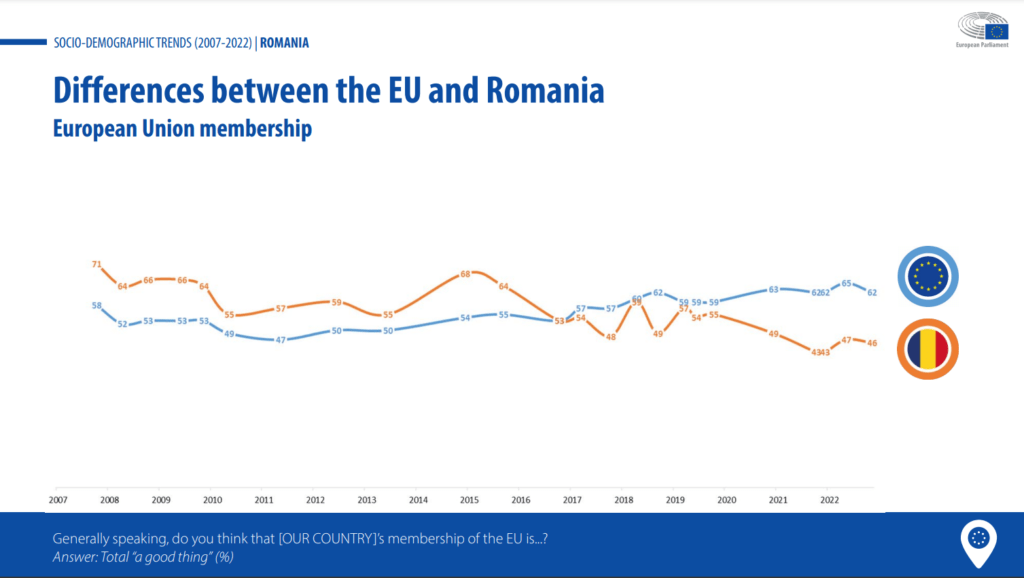
Not only that but the proportion of individuals who still believe that being a part of the EU benefits them fell from 72% in 2020—which was and remains the average for Europe—to 62% presently. In just two years, there has been a 6% decline.
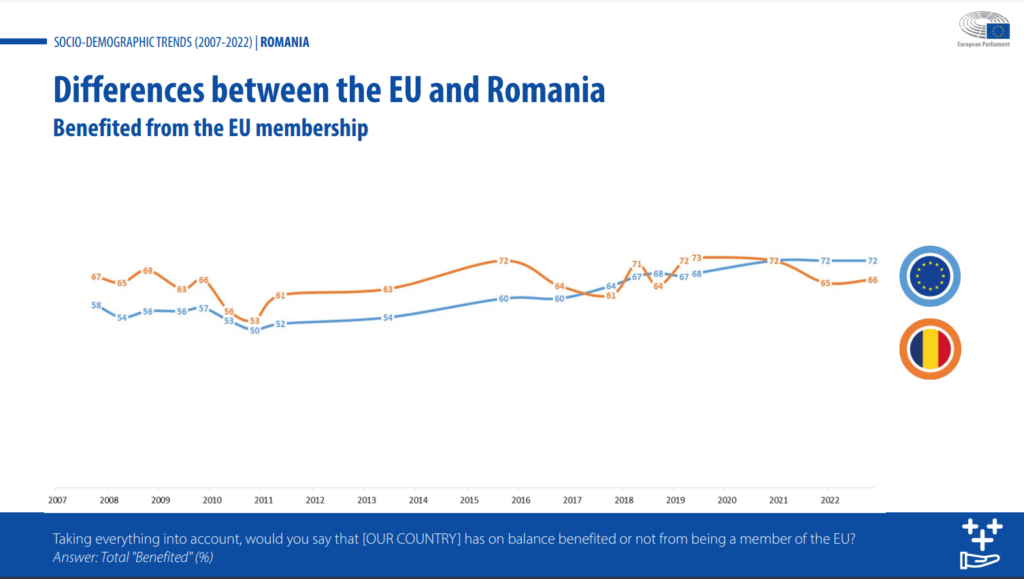
39% of Romanians who were asked why they valued their country’s participation in the EU said it was for the employment prospects. This is due to the fact that millions of Romanians labor overseas. On the other side, the study reveals that Romania falls well short of the EU average in terms of valuing the EU’s economic contribution to the development of the nation or its contribution to restoring peace and security in Romania. Given the EU’s failure to solidify the peace in the region, it is understandable why they think this way. The Romanian people don’t notice much of an impact from the EU, just from NATO, as the so-called „special operation” is taking place close by.
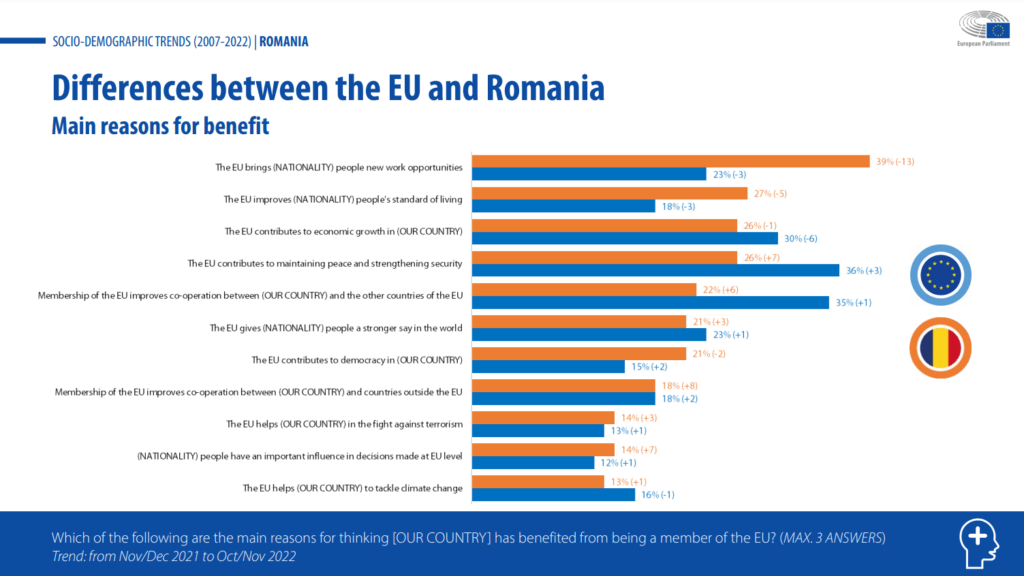
How did Romanians lose trust in their leaders and the EU and why did this happen?
Although the pandemic may have been a major factor in this, we must admit that Romanian officials may have had a part to play. The lawmakers merely seemed to the Romanians as a group of individuals who faithfully carried out EU directives. Romania implemented one of the most autocratic regimes during the pandemic to impose quarantine regulations on its inhabitants. The government once sent personnel armed with heavy machine guns and military trucks onto the streets to deliver a straightforward message: we set the rules now!
Romania also demonstrated unrestricted devotion to Brussels by spending billions and purchasing tens of millions of vaccination shots, just to dispose them now that they had expired. These may be the main reasons why the country is losing trust in the EU.
Also, the recent developments at the European level made more Romanians reject European values. While keeping Romania out of Schengen, European politicians should consider that the country could retaliate. Boycotts against Western companies are underway in Romania. Instead of understanding the people and trying and fulfill their rightful demands, politicians in Bruxelles blame the Russian rhetoric whenever they spot opposition to the European institutions.
Now, the Romanian Government and the country’s elites reap what they sow: the lack of trust of Romanians in the European institutions is only the consequence of how the politicians in Bruxelles and Bucharest treated the population. Suppose anyone in Bruxelles would like to change the current trend and the widening gap between the Romanians and the EU. In that case, they should try and understand that it’s not Russia to be blamed but their own decisions and behaviour.
- Published in News



